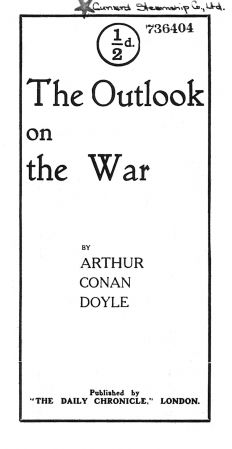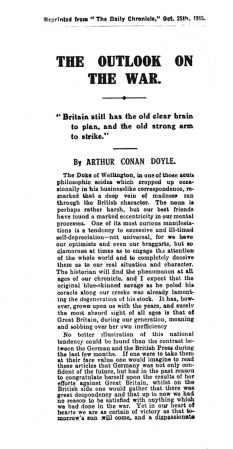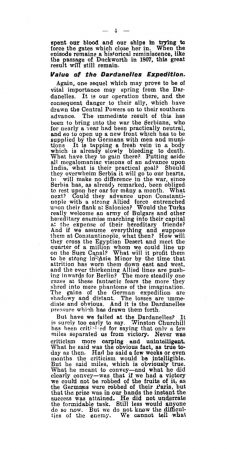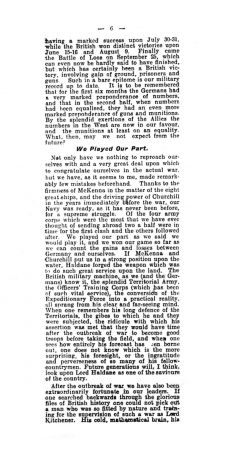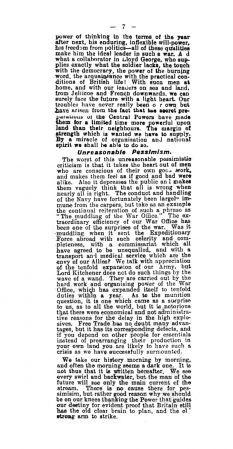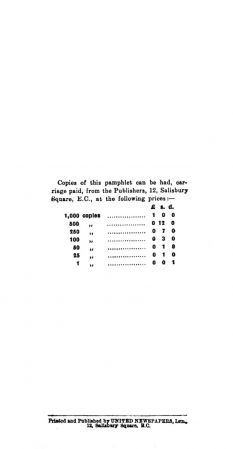The Outlook on the War
The Outlook on the War is a pamphlet written by Arthur Conan Doyle published on 24 october 1915 in The New York Times and translated just after in the same year in 6 languages (Spanish, Dutch, Swedish, Danish, French and German).
Editions
- in The New York Times (24 october 1915 [US]) as Conan Doyle Sees Victory for England; One Successful Pounce Will Win
- The Outlook on the War (25 october 1915, The Daily Chronicle [UK]) as The Outlook on the War
- El Aspecto de la Guerra (1915, Thomas Nelson & Sons [UK]) Spanish edition
- Oorlogskiekje (1915, Thomas Nelson & Sons [UK]) Dutch edition
- Syn på Kriget (1915, Thomas Nelson & Sons [UK]) Swedish edition
- Overblik Over Krigen (1915, V. Pios Boghande [DK]) Danish edition
- Coup d'oeil sur la guerre (1915, Darling & Son, Ltd. [UK]) French edition
- Coup d'oeil sur la guerre (1915, Payot et Cie [UK]) Swiss edition
- Ein Blick auf den Krieg: Eine Erwagung Kriegsaussichten (1915, Darling & Son, Ltd. [UK]) German edition
The Outlook on the War


Conan Doyle Sees Victory for England; One Successful Pounce Will Win
Declares Mistakes Few and Triumphs Many, Scouts Fantastic Fears, and Pictures the Germans as Walking Into a Trap in Their March Into Turkey.
By Sir Arthur Conan Doyle.
Copyright. 1915, by The New York Times Company. — (Copyrighted also In Great Britain.) Special Cable to THE NEW YORK TIMES.
LONDON, Oct. 23. — The Duke of Wellington, in one of those acute philosophic asides which cropped tip occasionally in his businesslike correspondence, remarked that a deep vein of madness ran through the British character. The noun is perhaps rather harsh, but our best friends have found marked eccentricity in our mental processes. One of the most curious manifestations is a tendency to excessive and ill-timed self-depreciation, not universal, for we have our optimists and even our braggarts, but so clamorous at times as to engage the attention of the whole world and completely deceive them as to our real situation and character.
The historian will find the phenomenon at all ages of our chronicle, and I expect that the original blue-skinned savage, as he poled his corracle along our creeks, was already lamenting the degeneration of his stock. It has, however, grown upon us with the years, and surely the most absurd sight of all the ages is that of Great Britain during our generation moaning and sobbing over her own inefficiency, while rapidly gathering up as much of the earth's surface and of the world's wealth as she could possibly lay her hands upon.
No better illustration of this national tendency could be found than a contrast between the German and British press during the last few months. If one were to take them at their face value, one would imagine, to read these articles, that Germany was not only confident of the future, but had in the past reason to congratulate herself upon the results of her efforts against Great Britain, while, on the British side, one would gather that there was great despondency and that up to now we had no reason to be satisfied with anything which we had done in the war.
Yet in our heart of hearts we are as certain of victory as that tomorrow's sun will come, and a dispassionate survey will satisfy any student of history that no great war in which our country has ever been engaged has been marked in the same space of time by such triumphant successes as those of the last fourteen months. Our troubles have been those of our allies; our victories have largely been our own. Germany can make a good showing up to date against the coalition. Against Great Britain she has been beaten at every turn.
What Britain Has Done.
Consider what we have done in this short space of time and compare it with the opening Of any of our greater wars. In our war against the French Republic it was nearly two years after its inception that Howe's victory gave us a gleam of success. In the great war against Napoleon it was again two years before Trafalgar ended the fear of imminent invasion and twelve years of very varying fortunes before we won through.
Now, look at the work of fourteen months. We have annexed the whole great German colonial empire, with the exception of East Africa and district in Kameruns ; we have swept the German flag, both imperial and mercantile, off the face of the ocean; we have completely sterilized her fleet; we have repelled her serious submarine attack; played our game so skillfully that the flux of time shows us stronger, not weaker, In comparison; we have conquered South Mesopotamia from the Turks; we have completely repelled their attempted invasion of Egypt; we have helped to save Paris; we have, with French end Belgian assistance, but mainly by our own exertions, stopped the advance upon Calais, inflicting a loss of several hundreds of thousands upon the Germans; we have, by our intervention at Antwerp, helped to extricate the Belgian Army; finally, and greatest of all, we have raised an enormous voluntary army, which is large enough to turn the scale between the European forces, and we have converted ourselves, with wonderful adaptability, into the great factory and munition store of the Allies.
That is our story, and if any man cannot see that it is a wonderful one, he is not merely a pessimist, but blind. What have we to put on the other side of the account? I am dealing for the moment with large results, and not with details. Where have we failed?
The Dardanelles.
In the whole world our most severe critic could only point to one place — the Dardanelles. But have we failed in the Dardanelles?
I believe that if we should never force the strait the enterprise has none the less been worth the undertaking. We have lost 100,000. How many have the Turks lost? Certainly not lees. We have held up a great body of their best troops, who would otherwise have been operating against us on the Egyptian and Mesopotamian fronts or in the Caucasus against the Russians. General Ian Hamilton has taken the pressure off General Maxwell on the one side and General Nixon on the other.
But the greatest of all the results from the Dardanelles expedition is that it has united us with Russia as nothing else could have done. She cannot now say, as she might have said, that we thought only of our own empire. We have spent our blood and our Iships in trying to force the gates which close her in. When the episode remains a historical reminiscence, like the passage of Admiral Duckworth in 1807, this great result will still remain.
Again, one sequel which may prove to be of vital importance may spring from the Dardanelles. It is our operation there and the consequent danger to their ally which has drawn the central powers on to their southern advance. The immediate result of this has been to bring into the war the Serbians, who for nearly a year had been practically neutral, and so to open up a new front, which has to be supplied by the Germans with men and munitions. It is tapping a fresh vein in a body which is already slowly bleeding to death.
What have they to gain there? Putting aside all megalomaniac visions of an advance upon India, what is their practical goal? Should they overwhelm Serbia, it will go to our hearts, but will make no difference In the war, since Serbia had, as I already remarked, been obliged to rest upon her oars for many months. What next could they advance upon? Constantinople, with a strong allied force intrenched upon their flank at Saloniki? Would the Turks really welcome an army of Bulgars and other hereditary enemies marching into their capital at the expense of their hereditary friends?
And if we assumed everything and suppose them at Constantinople, what then? How will they cross the Egyptian desert and meet the quarter of a million whom we could line up on the Suez Canal? What will it profit them to be strong in Asia Minor by the time that attrition has worn them down eat and west and the ever-thickening allied lines are pushing inward for Berlin?
German Gains Shadowy.
The more steadily one gazes at there fantastic fears the more they shred into mere phantoms of the imagination. The gains of the German expedition are shadowy and distant, the losses are immediate and obvious, and it is the Dardanelles pressure which has drawn them forth.
But have we failed at the Dardanelles? It is surely too early to say. Mr. Winston Churchill has been criticised for saying that only a few miles separated us from victory. Never was criticism III( ire carping and unintelligent. What he said was as obvious fact, as true today as then. Had he said a few weeks, or even months, criticism would be intelligible, but he said miles, which was obviously true. What he meant to convey, and what he did clearly convey, was that if we had the victory we could not be robbed of the fruits of it as the Germans were robbed of their Paris, but that the prize was in our hands the instant the success was attained. He did not underrate the formidable task. Still less would any one do so now. But we do not know the difficulties of the enemy. We cannot tell what weakening may occur or what change may come. We are ready on land and sea, and it is as true as ever that it is only a question of one successful pounce.
It is surely too early to write off the Dardanelles loss and to put it down as the one single item which should appear upon the debit side of our account, but I repeat that if there is no forcing of the strait, none the less the historian of the future may very well find that the operations have had far-reaching and fateful results.
Britain's Western Campaign.
On the military side, in our campaign of France and Flanders, great events have been so close to us and have confused us so with their successive concussions that one has to cultivate some mental detachment In order to get their proportion and their relation to each other or to the permanent values of history. So far as the British campaign is concerned, the following summary would in the main be correct:
The campaign began by defeats, honorable and inevitable, but none the less defeats, at Mons Aug. 23, and Le Cateau Aug. 26. This was followed by the victory of the Marne, Sept. 6-11, in which the honors rest with our French allies, and the drawn battle of the Aisne on Sept. 13, in which for the first time immoble lines were formed, a confession of failure upon the part of the invaders. There followed the long-drawn, scrambling action of La Bassée, Oct. 12-31, in which no result was obtained and immobility was again enforced. Simultaneously was fought the first battle of Ypres, Oct. 20-Nov. 13, in which the Germans were repelled, with very heavy losses, in their repeated attempts to capture that city.
This brought the fighting of 1914 to an end, save for the sharp fight at Festubert, Dec. 19-21, where the British sustained a reverse on the first day, which was equalized by a successful counterattack on the second.
The campaign of 1915 began with the costly British victory at Neuve Chapelle on March 10, involving the permanent capture of the village. There followed the local but intense fighting of Hill 60, which ended in a complete British victory at the time, though the garrison was afterward driven out by poison on May 5.
Then came the second battle of Ypres, from April 22 to May 24, one of the great battles of all time, in which the Germans failed again in their main objective, to capture the town and break the line, but did succeed in taking four heavy guns and some prisoners from us, besides gaining about two miles of ground along a front of twenty miles. It may therefore be fairly described as a German success. Before this fight had ended a second battle had broken out further down the line — the battle of Richebourg, May 9-24, which began by a bloody repulse of the British attack, but ended by a considerable and permanent gain of ground.
Then followed the fighting around Hooge, which continued with about equal fortunes during the whole Summer, the Germans having marked success on July 30-31, while the British won distinct victories on June 15-16 find Aug. 9.
Finally came the battle of Loos on Sept. 25, which can even now be hardly said to have finished, but which certainly has been a British victory, involving a gain of ground, prisoners, and guns.
Such, in bare epitome, is our military record up to date. It is td be remembered that for the first six months the Germans had a very marked preponderance of numbers, and that in the second half year, when the numbers had been equalized, they had an even more marked preponderance of guns and munitions. By the splendid exertions of the Allies the numbers in the west are now in our favor and the munitions at least on an equality.
What, then, may we not expect from the future?
Very Few Mistaken Made.
Not only have we nothing to reproach ourselves with and a very great deal upon which to congratulate ourselves in actual war, but we have, as it seems to me, made remarkably few mistakes. Beforehand, thanks to the firmness of Mr. McKenna (First Lord of the Admiralty, 1908-1911) in the matter of the eight great ships, and the driving power of Mr. Churchill (First Lord from 1911 to 1915) in the years immediately before the war, our navy was ready as it had never been before for a supreme struggle. Of the four army corps, which were the most that we had ever thought of sending abroad, two and a half were in time for the first clash, and the others followed. We played our part as we said we would play it, and we won our game, so far as we can count gains and losses, between Germany and ourselves.
If Mr. McKenna and Mr. Churchill put us in a strong position upon the water Lord Haldane (ex-War Secretary) forged the weapon which was to do such great service upon the land, the British military machine as we and the Germans know it. The splendid Territorial Army, the officers' training corps, which has been of such vital service, the conversion of the expeditionary force into a practical reality — all sprang from his clear and far-seeing mind. When one remembers his long defense of the territorials, the gibes to which he and they were subjected, the ridicule with which his assertion was met that they would have time after the outbreak of the war to become good troops before taking the field, and when one sees how entirely his forecast has been borne out, one does not know which is the more surprising — his foresight or the ingratitude and perverseness of so many of his fellow-countrymen. Future generations will, I think, look upon Lord Haldane as one of the saviors of the country.
After the outbreak of the war we have also been extraordinarily fortunate in our leaders. If one searched backward through the glorious files of British history one could not pick on a man who was so fitted by nature and training for time supervision of such a war as Lord Kitchener. His cold, mathematical brain, his power of thinking in terms of the year after next, his enduring, inflexible will power, his freedom from politics — all of these qualities make him an ideal leader in such a war.
And what a collaborator in Mr. Lloyd George, who supplies exactly what a soldier lacks — the touch with the democracy, the power of the burning word, acquaintance with practical conditions of British life!
With such men at home, and with our leaders on sea and land, from Admiral Jellicoe and Field Marshal French downward, we can surely face the future with a light heart. Our troubles have never really been our own, but have arisen from the fact that the secret preparations of the central powers have made them for a limited time more powerful upon land than their neighbors. The margin of strength which is wanted we have to supply. By a miracle of organization and national spirit we shall be able to do so.
The Dangers in Pessimism.
The worst of this unreasonable, pessimistic criticism is that it takes the heart out of men who are conscious of their own good work and makes them feel as if good and bad were alike. Also, it depresses the public and makes them vaguely think that all is wrong when nearly all is right. The conduct and handling of the navy have fortunately been largely immune from carpers, but take as an example the continual reiteration of such phrase as "The muddling of the War Office." The extraordinary efficiency of our War Office has been one of the surprises of the war. Was it muddling when it sent an expeditionary force abroad with such celerity and completeness, with a commissariat which all agreed to be unequaled and with transport and medical service which are the envy of our allies?
We talk with appreciation of the tenfold expansion of our army, but Lord Kitchener does not do such things by a wave of a wand. They are carried out by the hard work and organizing power of the War Office, which has expanded itself to tenfold duties within a year.
As to the munition question, it is one which came as a surprise to Mi, as to all the world, but it is notorious that there were economical, and not administrative, reasons for the delay in high explosives. Free trade has no doubt many advantages, but it has its corresponding defects, and if you depend upon production in your own land you are likely to have such a crisis as we have successfully surmounted.
We take our history morning by morning, and often the morning seems a dark one. It is not thus that it is written hereafter. We see every swirl and backwater, but the man of the future will see only the main current of the stream. There is no cause there for pessimism, but rather good reason why we should on our knees, thanking the Power that guides our destiny for evident proof that Great Britain still has the old clear brain to plan and the old strong arm to strike.
ARTHUR CONAN DOYLE.
More sources
- The Daily Chronicle (25 october 1915)
-
-
p. 2
-
p. 3
-
p. 4
-
p. 5
-
p. 6
-
p. 7
-
p. 8
